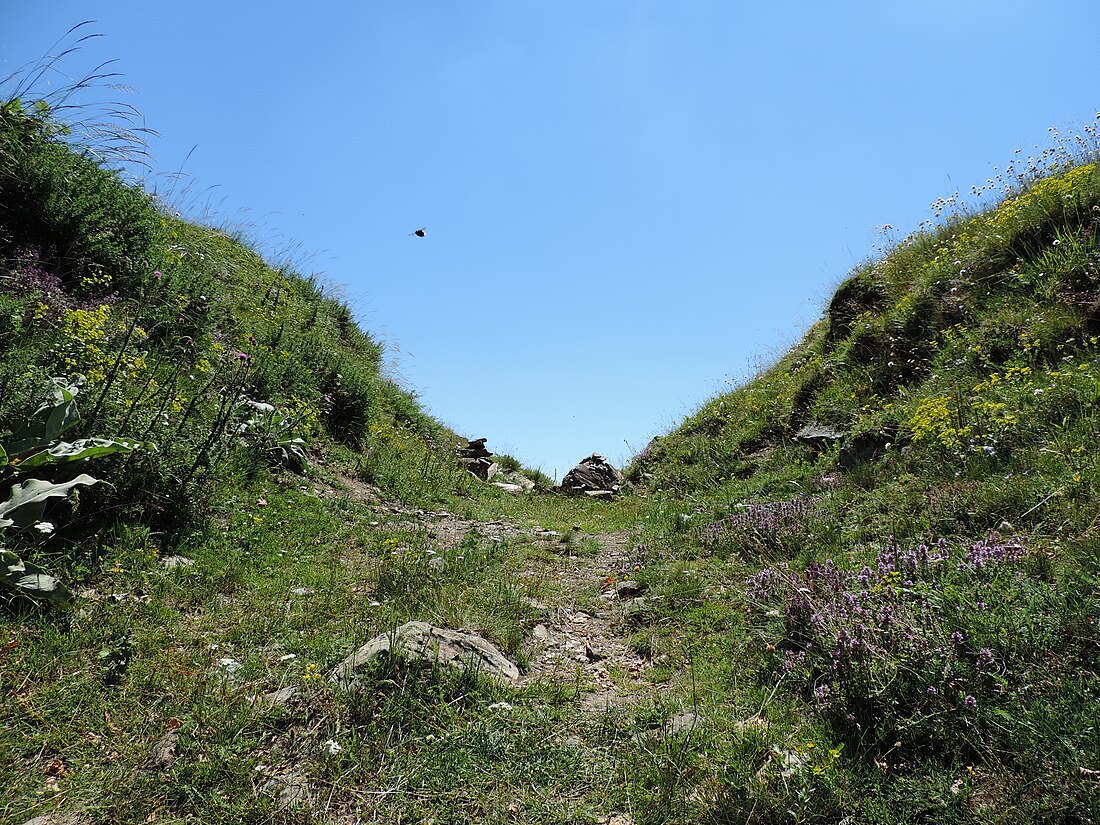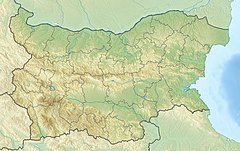Incident at Petrich
Minor military conflict between Bulgaria and Greece in October 1925 From Wikipedia, the free encyclopedia
The Incident at Petrich (Greek: Επεισόδιο του Πετριτσίου; Bulgarian: Петрички инцидент), or the War of the Stray Dog (Greek: Πόλεμος του αδέσποτου σκύλου),[1] was a Greek–Bulgarian crisis in 1925 that resulted in a brief invasion of Bulgaria by Greece near the border town of Petrich after the killing of a Greek captain and a sentry by Bulgarian soldiers.[2] The incident ended after a decision by the League of Nations.
This article needs additional citations for verification. (May 2011) |
You can help expand this article with text translated from the corresponding article in Greek. (March 2018) Click [show] for important translation instructions.
|
| Incident at Petrich | |||||||||
|---|---|---|---|---|---|---|---|---|---|
 Demir Kapia, where the original incident took place. | |||||||||
| |||||||||
| Belligerents | |||||||||
|
Bulgaria IMRO | Greece | ||||||||
| Commanders and leaders | |||||||||
|
Boris III Aleksandar Tsankov Ivan Mihailov |
Pavlos Kountouriotis Theodoros Pangalos | ||||||||
| Strength | |||||||||
| 10,000 | 20,000 | ||||||||
| Casualties and losses | |||||||||
| 50 Killed (Nationality Unknown) | |||||||||
Background
Summarize
Perspective
Relations between Greece and Bulgaria had been strained since the early 20th century by their rivalry over the possession of Macedonia and later Western Thrace, which led to years of guerrilla warfare between various pro-Bulgarian Macedonian paramilitaries and the pro-Greek HMC in the Macedonian Struggle (c. 1904 - 1908). Open conflict broke out between Greece and Bulgaria during the Second Balkan War (1913) and the First World War (1916–1918). The outcome of these conflicts was that Aegean Macedonia and Western Thrace came under Greek rule.
Due to the significant Bulgarian populations in both regions,[3] they became targets of Bulgarian irredentism throughout the interwar period. Two organisations, the Internal Macedonian Revolutionary Organisation (IMRO) and the Internal Thracian Revolutionary Organisation (ITRO), based in Bulgaria, launched raids and terrorist attacks into Greek and Yugoslav territory.[4]
Petrich was the administrative centre of the Bulgarian-held Pirin Macedonia in which, during the early interwar years, the IMRO ran as a "state within a state".[5]
In 1923, Bulgarian Prime Minister Aleksandar Stamboliyski was murdered by IMRO following his deposition in a coup d'état. This was due to his policies of rapprochement, which were deeply unpopular with IMRO and nationalist factions in Bulgaria.[6]
Incident
Location of Belasitsa, where Bulgarian soldiers killed a Greek soldier and a captain.
There are two versions of how the incident started.
In the first version, the incident began on October 18 by a Greek soldier running after his dog, which had strayed across the border from Greece at the pass Demir Kapia on Belasitsa (Belles). It is thus sometimes referred to as the War of the Stray Dog.[7] The border was guarded by Bulgarian sentries, one of whom shot the Greek soldier.
In the second version, the incident was caused on October 18 by Bulgarian soldiers, who crossed the Greek border, attacked a Greek outpost at Belasitsa and killed a Greek captain and a sentry.[2][8]
Bulgarian and Greek reactions
Bulgaria explained that the firing was caused by a misunderstanding and expressed its regret.[9]
In addition, the Bulgarian government proposed the formation of a mixed commission of Greek and Bulgarian officers to investigate the incident, but the Greek government declined as long as Bulgarian troops remained on Greek territory.[10]
The Greek government, led by General Theodoros Pangalos, issued an ultimatum to Bulgaria of 48 hours[11] to punish those responsible,[12] an official apology,[13] and two million French francs as compensation for the families of the victims.[14]
On October 22, 1925, Greece sent soldiers into Bulgaria to occupy the town of Petrich with the objective of enforcing the demands.[15]
International intervention
Summarize
Perspective

Fighting between Greek and Bulgarian forces started, and Bulgaria appealed to the League of Nations to intervene in the dispute. Some chetas of the Internal Macedonian Revolutionary Organization (IMRO), together with the sentries, organised defence lines against the Greeks near Petrich.[citation needed] Volunteers and war veterans from the whole region were summoned to join the resistance.[citation needed]
Greece made it clear that it was not interested in Bulgarian territory but demanded compensation.[15]
According to some contemporary newspapers, the town of Petrich was captured.[16] However, it seems that the town successfully resisted the Greek attacks.[17][18] In fact the League of Nations sent a telegraph to both countries to order them to stop their armies, just a few hours before the Greeks launched their attack.[19]
The League ordered a ceasefire, Greek troops to withdraw from Bulgaria and Greece to pay £45,000 to Bulgaria.
Both countries accepted the decision, but Greece complained about the disparity between its treatment and Italy's treatment during the Corfu incident in 1923, in which Italy invaded and occupied the island, forcing Greece to pay war restitutions. There was one rule in the League for the great powers like Italy and another for the smaller powers like Greece.[20]
The League Council sent military attaches from France, Italy and the United Kingdom to report to it when the hostilities ceased and to observe the withdrawal of the Greek troops. The attachés also decided that the Bulgarians should not reoccupy the territory until a certain time had elapsed to prevent incidents.[21]
The material and morale damage Greece had to pay was £45,000 (3 million Bulgarian levas) in compensation within two months,[22] while Bulgaria compensated the victim's family.
Over 50 people had been killed, mostly Bulgarian civilians, before Greece complied.[citation needed]
See also
References
External links
Wikiwand - on
Seamless Wikipedia browsing. On steroids.


